AMD Zen 3 Ryzen Deep Dive Review: 5950X, 5900X, 5800X and 5600X Tested
by Dr. Ian Cutress on November 5, 2020 9:01 AM ESTCPU Tests: Legacy and Web
In order to gather data to compare with older benchmarks, we are still keeping a number of tests under our ‘legacy’ section. This includes all the former major versions of CineBench (R15, R11.5, R10) as well as x264 HD 3.0 and the first very naïve version of 3DPM v2.1. We won’t be transferring the data over from the old testing into Bench, otherwise it would be populated with 200 CPUs with only one data point, so it will fill up as we test more CPUs like the others.
The other section here is our web tests.
Web Tests: Kraken, Octane, and Speedometer
Benchmarking using web tools is always a bit difficult. Browsers change almost daily, and the way the web is used changes even quicker. While there is some scope for advanced computational based benchmarks, most users care about responsiveness, which requires a strong back-end to work quickly to provide on the front-end. The benchmarks we chose for our web tests are essentially industry standards – at least once upon a time.
It should be noted that for each test, the browser is closed and re-opened a new with a fresh cache. We use a fixed Chromium version for our tests with the update capabilities removed to ensure consistency.
Mozilla Kraken 1.1
Kraken is a 2010 benchmark from Mozilla and does a series of JavaScript tests. These tests are a little more involved than previous tests, looking at artificial intelligence, audio manipulation, image manipulation, json parsing, and cryptographic functions. The benchmark starts with an initial download of data for the audio and imaging, and then runs through 10 times giving a timed result.
We loop through the 10-run test four times (so that’s a total of 40 runs), and average the four end-results. The result is given as time to complete the test, and we’re reaching a slow asymptotic limit with regards the highest IPC processors.
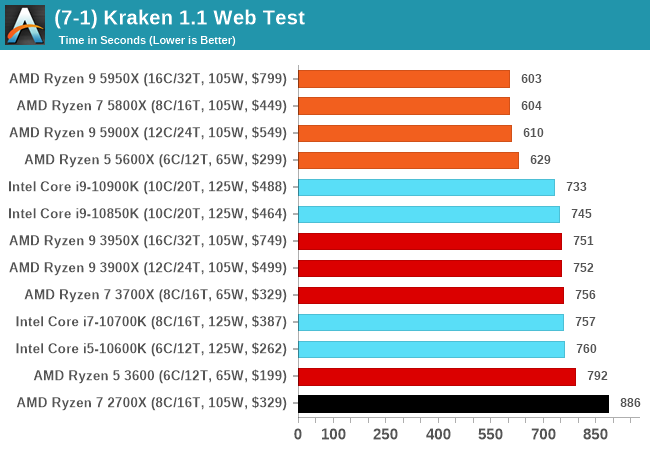
Google Octane 2.0
Our second test is also JavaScript based, but uses a lot more variation of newer JS techniques, such as object-oriented programming, kernel simulation, object creation/destruction, garbage collection, array manipulations, compiler latency and code execution.
Octane was developed after the discontinuation of other tests, with the goal of being more web-like than previous tests. It has been a popular benchmark, making it an obvious target for optimizations in the JavaScript engines. Ultimately it was retired in early 2017 due to this, although it is still widely used as a tool to determine general CPU performance in a number of web tasks.
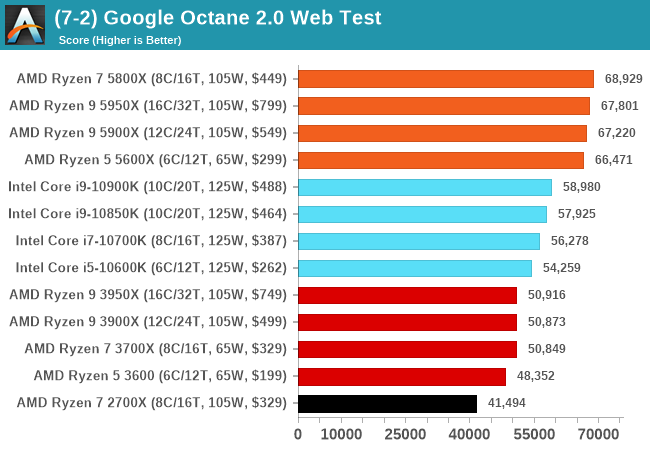
Speedometer 2: JavaScript Frameworks
Our newest web test is Speedometer 2, which is a test over a series of JavaScript frameworks to do three simple things: built a list, enable each item in the list, and remove the list. All the frameworks implement the same visual cues, but obviously apply them from different coding angles.
Our test goes through the list of frameworks, and produces a final score indicative of ‘rpm’, one of the benchmarks internal metrics.
We repeat over the benchmark for a dozen loops, taking the average of the last five.
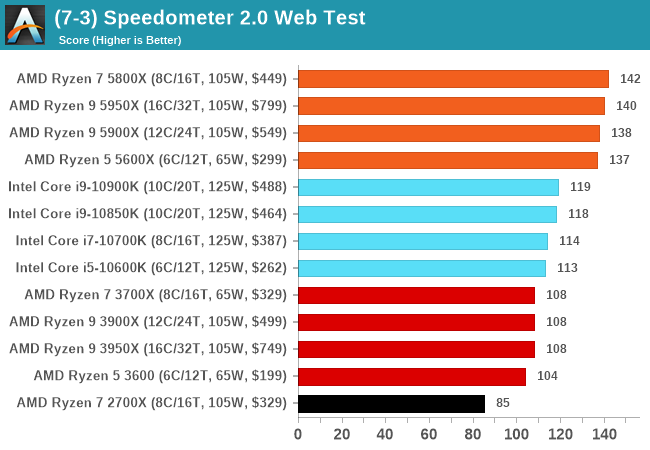
Legacy Tests
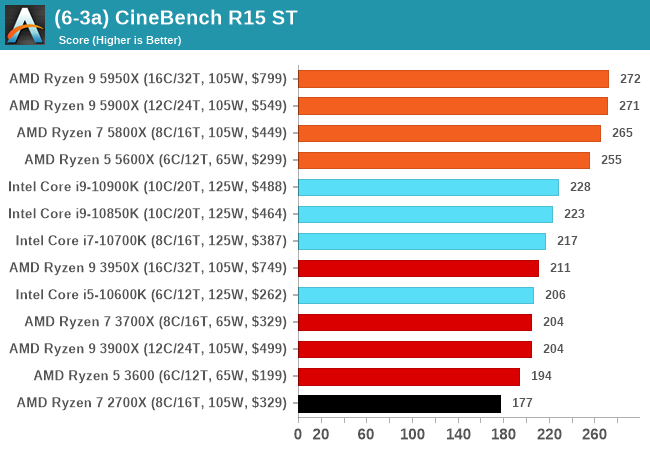
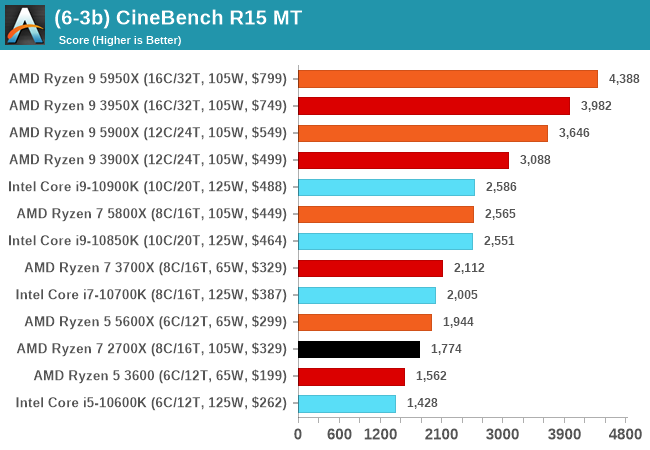
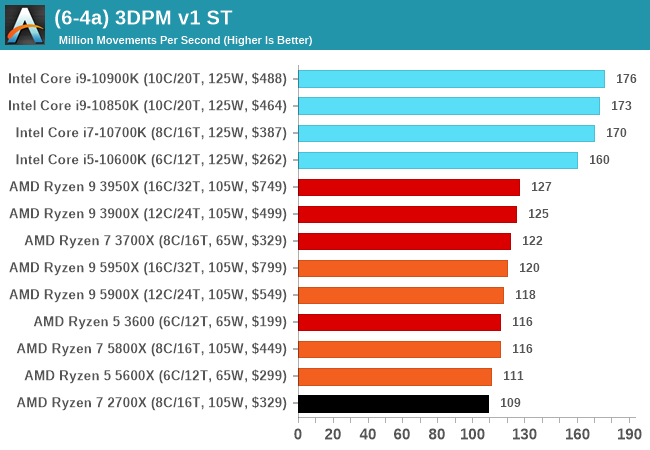
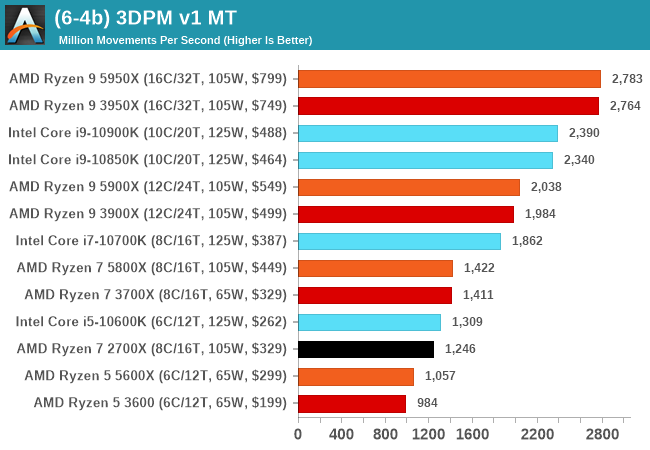


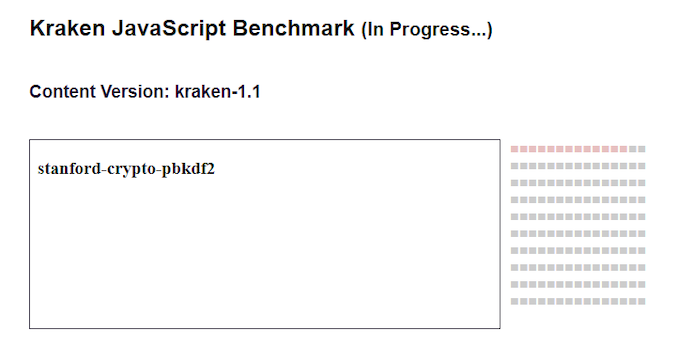
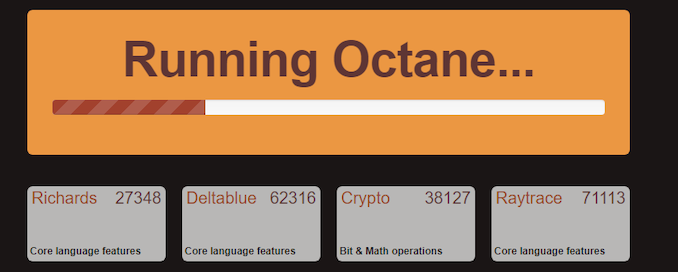
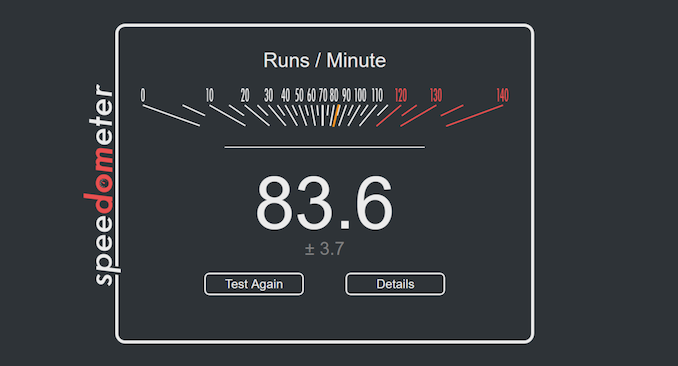








339 Comments
View All Comments
Jvanderlinde - Saturday, November 7, 2020 - link
Glad to read the 2700x is taken into account. The 5950X seems like a hell of an upgrade coming from that path. Gotta love AMD for what it's bin accomplishing in the last few years.Kallan007 - Saturday, November 7, 2020 - link
I just want to thank AMD for a lovely way to end 2020! I cannot wait for those AMD 6000 series card reviews! Good job as always AnandTech!Pumpkinhead - Saturday, November 7, 2020 - link
How is that possible that peak power for the 3700x having 8 cores is lower than for 3600 with 6 cores?nandnandnand - Saturday, November 7, 2020 - link
"Compared to other processors, for peak power, we report the highest loaded value observed from any of our benchmark tests."They selected the highest single wattage value from ANY of their tests. So at the same TDP, they should be very close to each other. I guess the point is to find the worst case scenario for each processor, rather than an average, to determine the power supply needed. Other reviews point to 3600 using less power on average:
https://www.tomshardware.com/reviews/amd-ryzen-5-3...
Pumpkinhead - Saturday, November 7, 2020 - link
>https://www.tomshardware.com/reviews/amd-ryzen-5-3...Interesting that 3700x being 1/3 faster in handbrake still draws only 13% more power, I always thought that in parallel workloads it power consumption scales linearly as you add more cores.
Even tho in AIDA stress test it draws 35% more power so peak consumption is different too, also look at the 5800x - draws almost twice as 5600x (also 6c vs 8c)
Kjella - Sunday, November 8, 2020 - link
It scales linearly until you hit the TDP, past that more cores lets you use a lower, more efficient frequency. As long as you can keep all cores loaded 8 cores on a 10W/core power budget will get less done than 16 cores at a 5W/core power budget even though 8*10 = 16*5. But with disabled cores you might have to run more of the chip, like the whole CCX to support 3 of 4 working cores. That will obviously be less efficient since the "overhead" has to be split by 3 instead of 4.Murilo - Saturday, November 7, 2020 - link
..and AMD price? ahahah.I want price!
psyclist80 - Saturday, November 7, 2020 - link
Im glad you guys added in Tiger Lake...very important data point. If it beat willow cove in its full implementation then its certainly going to beat the watered down 14nm version cypress cove and slay it on power efficiency.Im glad AMD has taken the crown back (last held 2003-2006)...as has been said in the past, the Empire will strike back...Hopefully Golden Cove can do that for Intel. That will face 5nm Zen 4 though...AMD looking strong for the next year or two!
Sushisamurai - Sunday, November 8, 2020 - link
apparently, looking at other reviews, there appears to be a performance uplift/downgrade (depends how you look at it) with the number of RAM sticks populated on the board (2 vs 4). I wonder how much of a difference it is with RAM speeds and memory stick population on the 5000 series.umano - Sunday, November 8, 2020 - link
I bought in june a 3800x and an x570 creator planning to upgrade to 5950x after zen 4 launches, but often, when we have more power, we find a way to crave for more. I work in fashion ph, for me the 35% bump in ps compared to my 3800x (bought because the price was the same as 3700) is a no brainer. It will also help me in capture one exports and zip compression. I did not think an upgrade so soon will benefit me so much, but you know life happens. Good job amd you made technology fun again